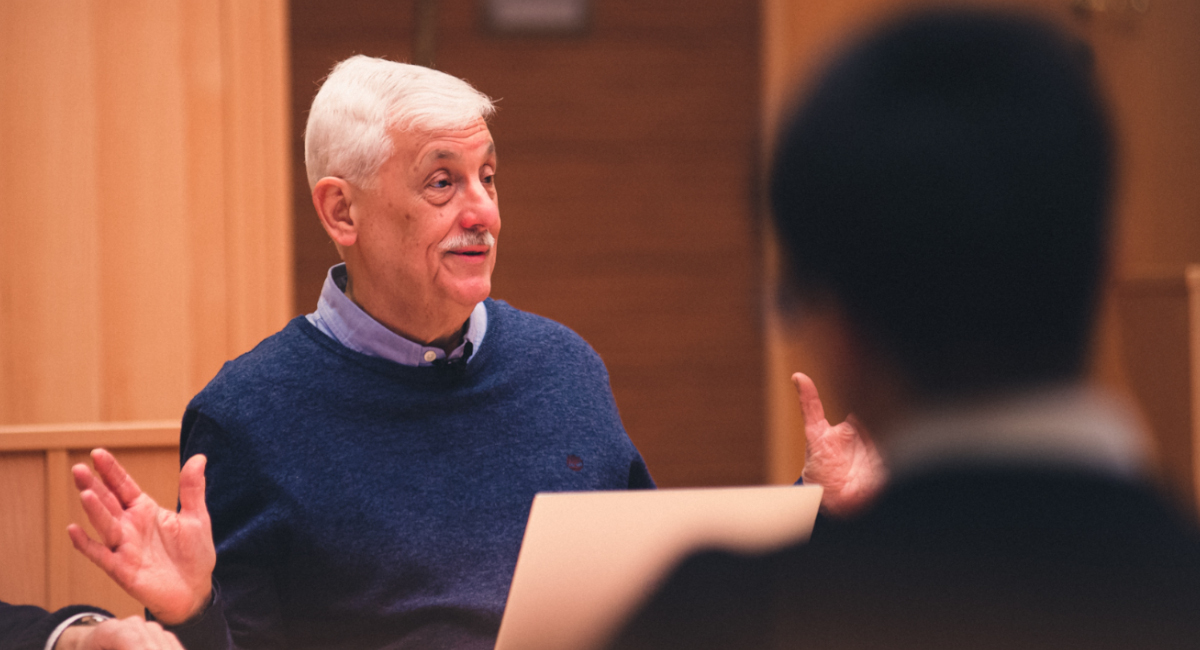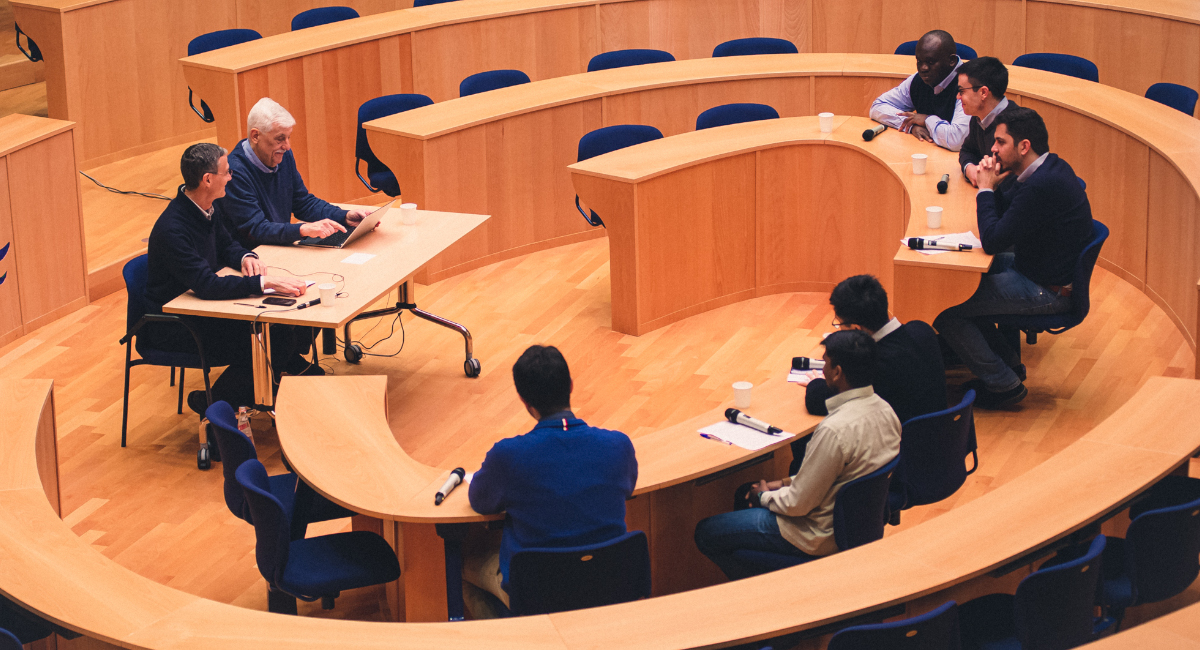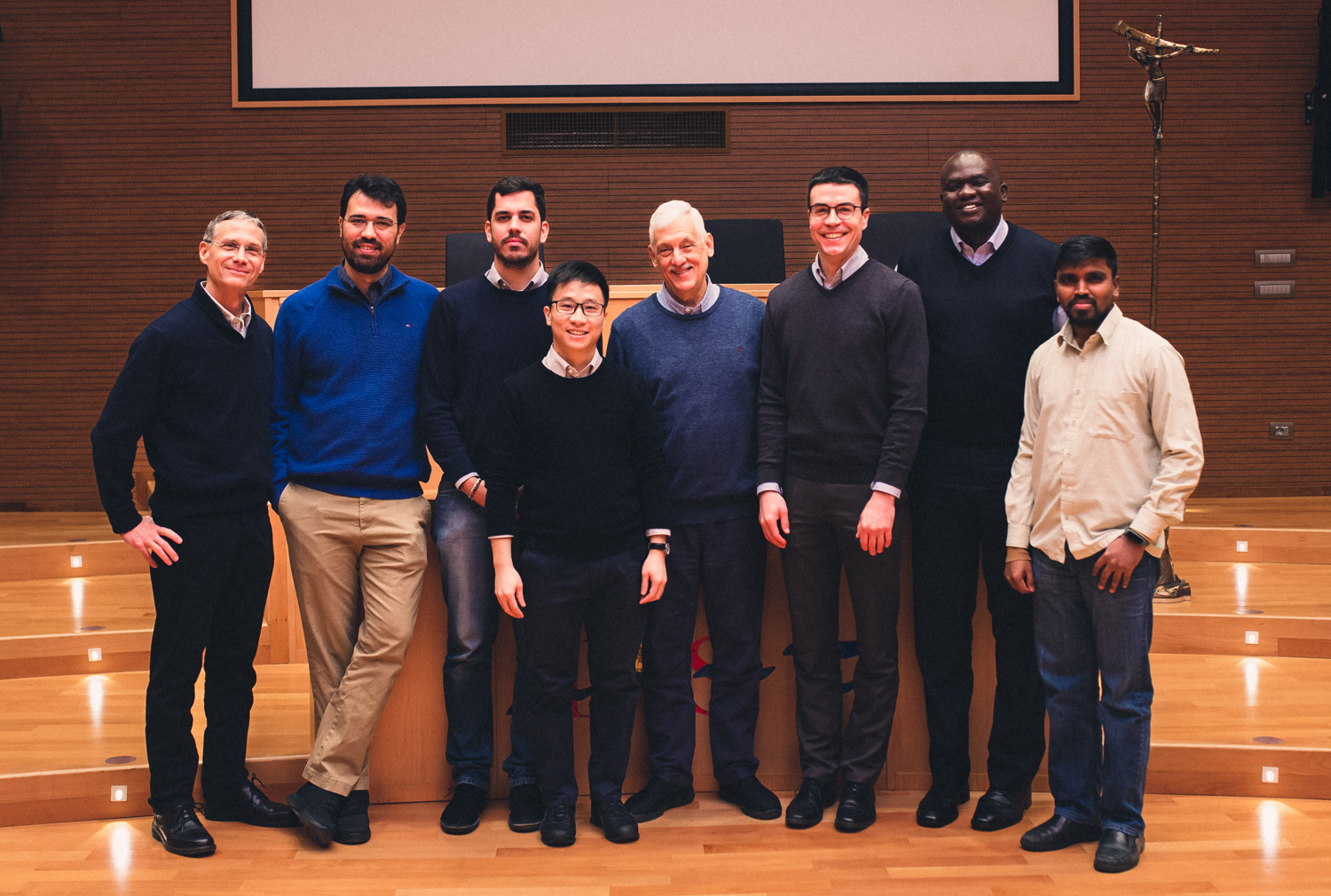
“I can answer it in different ways: Nothing new, everything new.”
Fr Arturo Sosa was responding to Gollapalle Krupa Rao, a scholastic from the Jesuit Conference of South Asia studying theology at the Pontifical Gregorian University in Rome. Gollapelle wanted to know how the UAPs fit into the traditional mission of the Society, or if they are simply a new way of describing what the Society of Jesus has been doing all these many years.
The Superior General’s reply was simple, yet clear and penetrating. The UAPs are not new in the sense that the mission of reconciliation and justice set forth in the past General Congregations is still the path the Society seeks to pursue today, but the UAPs are there to provide the instruments to go deeper in the mission.
“I think our newness, what is really new for us, is the experience of Jesus Christ. When we have a personal encounter with Jesus Christ, we have everything new; we have a new way of seeing things. And this is the point of the Universal Apostolic Preferences…to focus us on this encounter with Jesus,” said Fr Sosa.
Father General was in conversation with six young Jesuits – one from each of the six Jesuit Conferences – who had been invited to the Extended Council at the beginning of this year to participate in prayer and spiritual conversations, reflecting on how the UAPs are being integrated into formation. Fr Mark Ravizza, Father General’s Counsellor for Formation, was with the group, helping to guide the conversation.
The young men asked Father General how to make the UAPs more concrete in Jesuit life and mission today, how to overcome church indifference and inspire Jesuits to more fully embrace the UAPs as a path to renewal, and how to promote spiritual conversation and discernment around the UAPs and in their lives as Jesuits in formation.
Fr Sosa told them the basic vocation of all Jesuits, in fact all Christians, is to put ourselves in the hands of God. He recognised that it can be “very difficult and maybe it’s the most difficult attitude we need”.
“For Jesuits, it’s not easy, because, along our life, we acquire skills – intellectual skills or human skills – so we are very proud of our way of proceeding and doing things. And we need to, all the time, go back to the idea that we are not in control.”

For Fr Sosa, the mission of studies is an invitation to humility, and not a path to gain honour. The more one studies, he said, the more one realises his ignorance. But he cautioned that it can also go the other way. “You can be touched with poverty, with humiliation, with humility; or you can go in the other direction, to feel that because you are a person who has studied, you need honour, you have to be honoured, and you [become] superfluous.” He asked them to constantly examine themselves, whether they are growing in the path of being poor and humble as Jesus was.
He also asked them to live the Spiritual Exercises in their daily life, and not leave it as a onetime experience in the novitiate. “Without experience, the Exercises are just a piece of paper,” he said. Integrating the Exercises in one’s life means contemplating Jesus Christ as the model of our life, a model of our mission. “To re-live the process of the Cross and the Resurrection – all that is part of ordinary life.”
Responding to the question, “How would you like to see the Society move forward in the fourth preference on the care for our common home?” Fr General Sosa admitted that it is a big concern for him, and the Society is “moving very slowly”. The JCAP Plan 2021-2025 underscores the call of poverty and reconciliation with creation as a topmost priority, having the UAPs as an overarching orientation. “We need to be more open, to talk, to discern,” said Fr General Sosa. “I think one of the big contributions of young people in the Society is to move our conscience in that direction. And to promote small and big changes in the Society.”
He encouraged the young Jesuits to keep that attitude of pushing for change. “Institutional conversion is a very hard process, but we also need to remember that institutions are very important…. I think it’s part of the design of the times now that institutions should be more flexible,” he said.
He noted that young people in the Society these days come from Africa, Asia, and Latin America, and the cultural diversity is a source of wealth for the Society. “A big challenge is how to integrate the diversity in the same body, following the same mission, following the same Lord.”

L-R: Fr Mark Ravizza SJ, Father General’s Counsellor for Formation; Fr Diogo Fernandes SJ from the Brazilian Province – Conference of Jesuit Provincials in Latin America and the Caribbean; Scholastic Giovanni Barbone from the Euro Mediterranean Province – Jesuit Conference of European Provincials; Scholastic Joseph Tran Ngoc Huynh SJ from the Vietnamese Province – Jesuit Conference of Asia Pacific; Fr General Arturo Sosa SJ; Fr Michael Rossmann SJ from the US Midwest Province – Jesuit Conference of Canada and the United States; Fr Joseph Mboya from the Eastern Africa Province – Jesuit Conference of Africa and Madagascar; and Scholastic Gollapalle Krupa Rao from Andhra Province – Jesuit Conference of South Asia
Vietnamese scholastic and first year theology student, Joseph Tran Ngoc Huynh, asked Fr Sosa how to overcome indifference, even resistance, by some Jesuits and apostolic communities to change. In response, Fr Sosa recalled how General Congregation 32 defined a Jesuit as a sinner called to be a companion of Jesus.
“The fount of the resistance to every change comes from our condition as human beings. We are sinners… as persons and also as a body. Resistance is normal. If you don’t find resistance, you are changing nothing.”
He continued that the only way to overcome resistance is to “do an honest examen of our way of doing things in our personal life, community life or institutional life, or the body, the universal body of the Society”. He stressed the importance of discernment – to be sensible, aware, and authentic in our way of proceeding.
“When we discerned the UAPs, we didn’t have in mind the pandemic. We didn’t have in mind the war in Europe. We have war in other parts of the world, and we needed to integrate those experiences in the discernment of the UAPs. We didn’t have in mind the accent that Pope Francis is now putting on synodality. This is another aspect that changed in a certain way the atmosphere of the Church. So we need to be in touch with reality – sociological reality, political reality, ecclesial reality – to really understand where our Universal Apostolic Preferences are guiding us in how to proceed.”
Fr Sosa acknowledged that there will always be tension between who Jesuits should be, and who the Society is at the moment. “The day we say, ‘We are as we dream to be,’ we are not really saying the truth,” he said. The process of change in the Society has had a long history, said Fr Sosa, recalling in particular the time Fr General Adolfo Nicolás asked the provinces to discern “What are the calls of Jesus today?”
“My evaluation of the situation over these 10 years is that the Society has taken it very seriously. One of the signs of that is how we did the process of discernment of the Apostolic Preferences. It was a real process of putting ourselves before the Lord and saying, ‘Okay, talk to us and we will always try to respond’– with all our difficulties, our limitations, but we are trying to walk the talk.”
Confronted with the possibility of cynicism and a loss of hope and trust even among young Jesuits if the UAPs do not bring about authentic renewal, Fr General Sosa said that hopelessness is a temptation the Society needs to fight against. He acknowledged that processes can be slow, but the important thing is to keep moving. “Don’t lose your hope. Don’t lose your hope,” he repeated.
At 73 years old, Fr Sosa has seen many changes in the Society.
“I’m pretty old and I have more than 50 years in the Society. If I look back when I joined the Society and now, the Society has changed a lot. People have changed. I have shared my life with the same persons through time, and we are different; I am different. It’s a process of many years. It’s not a process of one month or three months or from a big experience that moved us. You need to really live, you know? It’s lifelong, and the Society will change in the long term, not only in short experiences.”
This conversation with Fr General Arturo Sosa is part of the Jesuit Futures series of the General Curia where Jesuits in formation from around the world have the opportunity to ask the Father General a question during a live meeting. This first part premiered on 23 April on YouTube. The second and final part was livestreamed as an interactive webinar on 30 April.
This article was updated on 2 May 2022.






